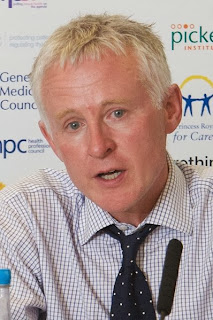British Health Minister calls gay-to-straight “reparative therapy" abhorrent- but rules out ban
 |
| Norman Lamb * File Photo* |
By Brody Levesque | LONDON -- Britain's Minister of State for Care and Support, (Health) Norman Lamb, told an audience during a special debate in Westminster Hall Wednesday that practitioners trying to convert gay patients to heterosexuality is "wholly abhorrent."
The debate was attended by Members of Parliament considering imposing regulations on the nation's psychotherapy sector regarding gay-to-straight conversion or “reparative therapy."
Lamb however, was not willing to call for a ban to be imposed by the UK government.
The debate was called at the request of Labour MP Sandra Osborne, who opposes the therapeutic practice, saying that she considers it "extremely harmful" to patients and little more than "voodoo."
During her speech, Osborne said:
"Virtually every major national and international professional organisation has condemned this practice as ineffective and potentially extremely harmful to patients. This is more than just a problem amongst religious fundamentalists, it’s an issue for the NHS and professional sector." She added;
"We also need to ensure that psychotherapists who aren’t members of professional bodies which explicitly have positions against conversion therapy, are not commissioned by the NHS." (National Health Service)
Lamb, who spoke after Osbourne noted,
"I find this practice wholly abhorrent and it has no place in a modern society. It is completely inappropriate for any GP [General Practitioner/M.D.]to be referring a patient for this sort of therapy." He added, "The Government are not aware the NHS commissions this type of therapy."
But he indicated that he was not convinced that regulation of the practice by Parliament was worthwhile telling the MP's,
"The Government believe state regulation will not be appropriate, as the cost of registration for therapists and for the taxpayer could not be justified."
Currently in the UK there is no minimum level of qualification that needs to be reached in order to practice as a psychotherapist, meaning anyone can set themselves up as a counselor reported Britain's Daily express newspaper.
There is a Private Members Bill set to be debated in the Parliament this coming January which would lead to regulation of the counselling sector. Osborne argued that introducing regulation into the profession which make it easier to stop conversion therapy being carried out.
A spokesperson for British LGBTQ Equality Rights group Stonewall UK reacted to the debate;
"We’re deeply concerned about voodoo ‘gay-cure’ therapies and their promotion and welcome any efforts from the Government and the UK Council for Psychotherapy to stamp out this damaging practice." Stonewall's senior health officer James Taylor said in a statement.
"In 21st century Britain, lesbian, gay and bisexual people should be able to access therapy and counselling services without fear of discrimination or judgement."
Supporters of the practice include the Christian Religious group, Core Issues, which claimed that there is no evidence that the practice of conversion or “reparative therapy" is harmful and any ban would show "an intolerance of those who wish to turn from homosexuality."
"The UK Parliament is in danger of promoting an injustice against a minority group who wish, quietly, to turn from homosexuality for personal and/or religious reasons without offence to any other group." the groups's president and chief spokesperson Dr. Mike Davidson said.
"We call on the government to ratify evidence-based scientific data, rather than to promote political ideology which exploits and uses people who understand themselves to be homosexual, for its own ends. We deplore such intolerance."
Scotland's Same-Sex marriage bill advances
By Mark Singer | EDINBURGH -- The Scottish Parliament voted 98-15 Wednesday evening to advance legislation that would bring marriage equality to Scotland with possible royal assent by Queen Elizabeth as early as March 2014. Scotish lawmakers passed the Marriage and Civil Partnership (Scotland) Bill on its first reading sending it to Parliament's Equal Opportunities Committee for consideration and debate along with any amendments offered by MP's.
The bill will the have a second reading where, if passed, would advance to a third and final reading before a final vote by the full Parliament, which political observers in the capital told LGBTQ Nation could occur as early as next spring. Once passed the bill then heads to the Queen for her assent which means that same-sex couples could begin marrying immediately afterwards.
Tom French, the policy coordinator for the Equality Network, said after the vote;
"Tonight the Scottish Parliament voted by an overwhelming majority to back same-sex marriage and uphold the principle that we should all be equal under the law. This vote is a huge step forward which will send out a strong message that LGBT people are equal and valued members of our society.
While there is still more work to do to improve the bill and ensure it becomes law, LGBT people across the country will be celebrating this significant milestone in the journey towards full equality."
Civil partnerships for same-sex couples have been legal in Scotland since 2005 in line with the rest of the United Kingdom, and recent polling in the country has shown than a majority of Scots support the move to full marriage equality, which British lawmakers had made legal earlier this year for Britain and Wales. Same-sex couples there will be allowed to get married also in 2014.
The strongest opposition to same-sex couples receiving the benefits of full marriage equality has been from both the Catholic Church and Church of Scotland although a religious exemption in the measure allows religious organizations and members of the clergy to refuse to marry gay and lesbian couples. The exemption would allow that an "opt in" by the churches to perform ceremonies for same-sex couples.
Lawmakers who spoke against the measure argued that the bill's religious exemptions weren't strong enough and that the law's premise would bring about the decline of modern moral society.






















0 comments:
Post a Comment